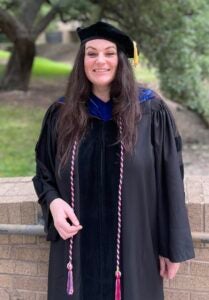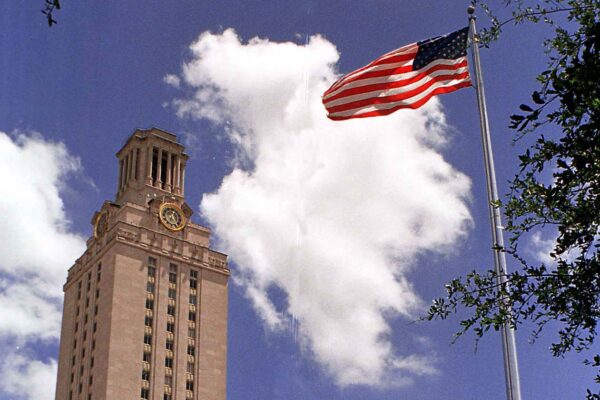This May, 72 Longhorns wore a new piece of regalia with their caps and gowns: cords designating their status as veterans of the United States military.
The red, white and blue cords with the word “Veteran” on a small gold-colored plate just above the tassel were given by the office of Veteran and Military Affiliated Services, a unit within the Office of the Dean of Students that helps veterans get the most out of their federal and state veterans education benefits.
We spoke to three graduating veterans who shared their UT experience.

Rebecca Larson, 36, joined the Air Force at 17 in 2004 and spent six years as an Arabic translator stationed just outside Baltimore, finishing her enlistment as a staff sergeant. She started at UT in 2013, and this May earned her Ph.D. in astronomy. This is her fourth UT degree, following bachelor’s degrees in physics and astronomy and a master’s in astronomy.
What have you overcome to get your degree?
Ph.D.s are unique experiences. It’s not like I had classes or a curriculum. I was finding my own projects and getting my own research grants. I was on my own journey and figuring out what I wanted that to be. I really struggle with the math, the physics and the technical part of programming, but I really enjoy the science aspect — discovering new things — and then sharing them with people. What’s the point of what we do if we don’t share it with others?
What has been your experience as a veteran at UT?
Jeremiah Gunderson [director of Student Veteran Services], I and a few others have spent literally a decade trying to make the UT experience positive for veterans. Mine was not when I got here and has been a struggle and a success story at the end of the day.
We implemented a new mentor program, so when a veteran applies, they get a mentor that helps them through the whole process. We demolished the Student Veterans Association and rebuilt it from the ground up so it was a much more inclusive place for everyone. There are a lot of uniquely weird difficulties that veterans face, like not being able to take prerequisites because the GI Bill won’t pay for them. There needed to be some training about how the GI Bill is different from just a normal person going through school. So Jeremiah and the VMAS office implemented an adviser training so academic advisers could learn what the GI Bill requirements are.
We give out more money at UT to student veterans than all of the other student veterans of America combined."
We created events such as tailgates, welcome-back barbecues and graduation events. Jeremiah has been phenomenal at finding donors to fund these things. The Jean Perkins Foundation Scholarships provide 50 $5,000 scholarships to make summer internships and research experiences possible. We give out more money at UT to student veterans than all of the other student veterans of America combined.
What’s next for you?
I’ve been accepted to be a postdoc researcher at the Rochester Institute of Technology. I’ll be continuing to study galaxies in the first billion years of the universe’s history using the Keck Observatory in Hawaii and the JWST [James Webb Space Telescope] that just launched. My area of expertise is studying galaxies in the early universe. We’ve tried to find them for many years, and now that we can find them more easily, we can understand how the universe was physically different than the one we live in today, so we can understand how those galaxies evolved into our own galaxy, how our galaxy got here, and, ultimately, how we got here.
***
Rosalva “Rosie” Bravo Ozuna, 26, is graduating with a Bachelor of Science in biology, marine and freshwater science, and a Bachelor of Science and Arts in chemistry. She served four years in the Marine Corps, completing her enlistment as a sergeant in Yuma, Arizona. She was the program coordinator for the calibration program, urinalysis program and the central technical publications library program for the Headquarters and Headquarters Squadron.
What did you overcome to get your degree?
I had to overcome my fear of not knowing anyone and not being able to reestablish a community. I’m from California, so moving to Texas was a little bold for me. I can happily say that I’ve met some amazing people. UT is full of promising people.
What was a favorite memory at the University?
My favorite memory is of doing a semester in Port Aransas at the Marine Science Institute. The late-night studying with my cohort, rigorous workload, and Barefoot Beans coffee runs are things I will cherish forever. In the Marine Corps, I developed strong friendships from sharing similar difficult experiences. In some way, the challenge I experienced academically in Port Aransas with the other students gave us a similar bond that I didn’t think I could make again.
The veterans and military-affiliated student community is a welcoming and positive group on campus that I am honored to be a part of."
Was UT able to help you?
UT’s office of Veteran and Military Affiliated Services was there for me my whole time at UT. It was the first place I went to register for classes, and it was a great place to get away to and study on campus. The veterans and military-affiliated student community is a welcoming and positive group on campus that I am honored to be a part of. The staff is also very knowledgeable and will do whatever they can to make sure students’ questions are being answered and they are getting the proper help they need.
What’s next for you?
I realized that I love doing research, so I’m going to work in a lab and go to grad school to get my Ph.D.
***
Max Wright, 40, earned his bachelor’s from UT in 2004 and just graduated from Dell Med. He was a special operations officer with the 3rd Marine Raider Battalion, Marine Corps. During his 10-year career he deployed to 16 countries, including combat deployments to Iraq, Afghanistan twice and Somalia. His final assignment was commander of Marine Special Operations Team 8333, and he left active duty shortly after being selected for the rank of major.
What did you overcome to get your degree?
Any career change is scary. The prospect of totally switching fields — from the military to medicine — was daunting. I had a career in place, I was advancing, and I had a future laid out, but I knew that I wanted to become a doctor, and it is a very long road and one that meant starting over, professionally, from square one. It takes humility to go from a position of experience and authority earned over many years to sitting in a classroom and admitting “I know nothing — teach me.” On top of that, I have two children, and I knew the time commitments of medical school would undoubtedly clash with my time spent with them, particularly once I started clinical rotations and spent up to 80 hours a week in the hospital.
It takes humility to go from a position of experience and authority earned over many years to sitting in a classroom and admitting 'I know nothing — teach me.'”
Has UT been able to help you?
I could really go on for pages and pages about all the help I’ve gotten from the office of Veteran and Military Affiliated Services, from my time as a return undergraduate completing prerequisites to my time as a medical student. I think if I could narrow it down to one particular issue, I fell into a strange administrative loophole with respect to education benefits under the VA’s Vocational Rehabilitation and Employment program that would have prevented me from being able to continue my studies. The VMAS went way beyond what I could have asked for in helping me rectify the situation, even helping me communicate with my congressman to adjust VA policy in a move that stands to benefit countless other veterans nationwide.
What are your favorite memories from your time at Texas?
This is actually my third time here — as an undergraduate student in the early 2000s, as a return undergraduate completing med school prereqs in 2017-2018, and now as a medical student for the last four years. Honestly, all of my close friends I met through the VMAS — other veterans in other programs at the University, both undergraduate and graduate students. I appreciate the lifelong friendships I’ve been able to make by connecting with other veterans.
What’s next for you?
I’m happy to say that I matched into the Emergency Medicine Residency Program right here at Dell Med, so I will be staying here for the next three years as a resident physician in emergency medicine.




